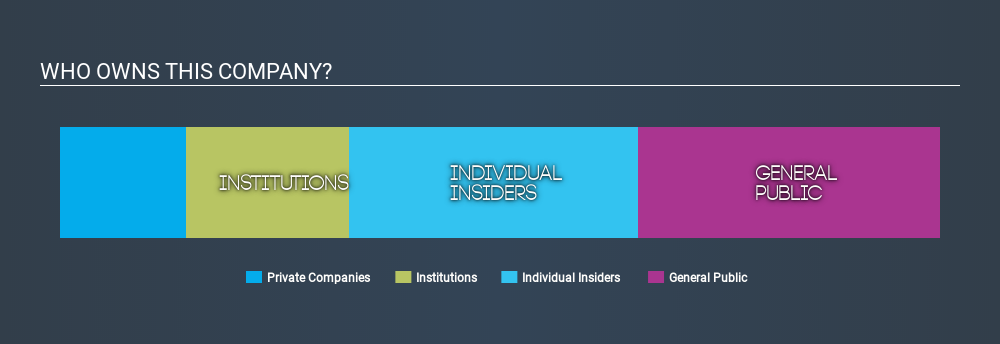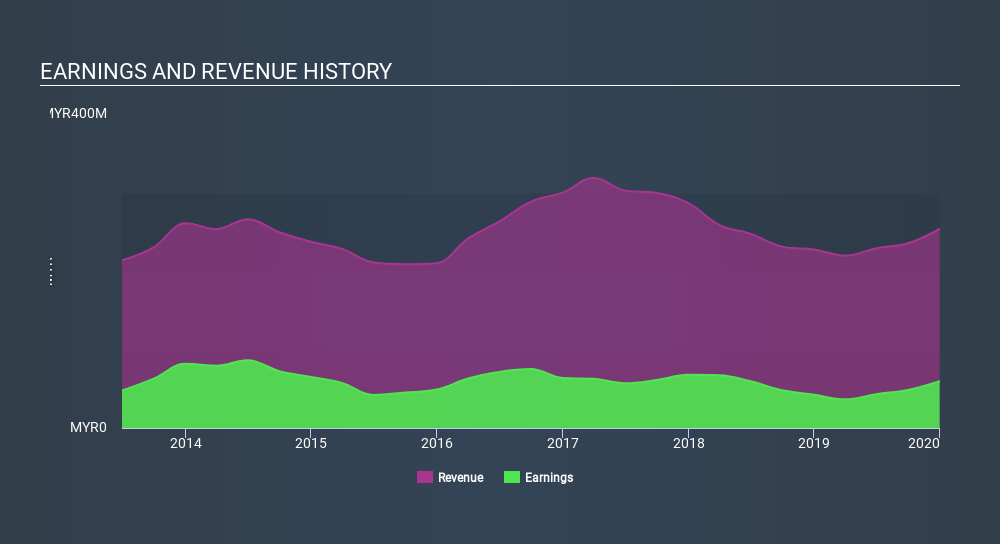What Kind Of Shareholders Own Datasonic Group Berhad (KLSE:DSONIC)?

Every investor in Datasonic Group Berhad (KLSE:DSONIC) should be aware of the most powerful shareholder groups. Large companies usually have institutions as shareholders, and we usually see insiders owning shares in smaller companies. Warren Buffett said that he likes "a business with enduring competitive advantages that is run by able and owner-oriented people." So it's nice to see some insider ownership, because it may suggest that management is owner-oriented.
Datasonic Group Berhad is not a large company by global standards. It has a market capitalization of RM1.4b, which means it wouldn't have the attention of many institutional investors. Taking a look at our data on the ownership groups (below), it's seems that institutions are noticeable on the share registry. Let's take a closer look to see what the different types of shareholder can tell us about Datasonic Group Berhad.
View our latest analysis for Datasonic Group Berhad

What Does The Institutional Ownership Tell Us About Datasonic Group Berhad?
Many institutions measure their performance against an index that approximates the local market. So they usually pay more attention to companies that are included in major indices.
Datasonic Group Berhad already has institutions on the share registry. Indeed, they own 19% of the company. This implies the analysts working for those institutions have looked at the stock and they like it. But just like anyone else, they could be wrong. When multiple institutions own a stock, there's always a risk that they are in a 'crowded trade'. When such a trade goes wrong, multiple parties may compete to sell stock fast. This risk is higher in a company without a history of growth. You can see Datasonic Group Berhad's historic earnings and revenue, below, but keep in mind there's always more to the story.

Hedge funds don't have many shares in Datasonic Group Berhad. Our data suggests that Ben Chew, who is also the company's Senior Key Executive, holds the most number of shares at 21%. When an insider holds a sizeable amount of a company's stock, investors consider it as a positive sign because it suggests that insiders are willing to have their wealth tied up in the future of the company. Next, we have Urusharta Jamaah Sdn Bhd and Demi Mekar Sdn Bhd. as the second and third largest shareholders, holding 9.3% and 7.2%, of the shares outstanding, respectively.
On further inspection, we found that 53% of the share register is owned by the top 6 shareholders, suggesting that the interests of the larger shareholders are balanced out to an extent by the smaller ones.
While studying institutional ownership for a company can add value to your research, it is also a good practice to research analyst recommendations to get a deeper understand of a stock's expected performance. There is some analyst coverage of the stock, but it could still become more well known, with time.
Insider Ownership Of Datasonic Group Berhad
The definition of company insiders can be subjective, and does vary between jurisdictions. Our data reflects individual insiders, capturing board members at the very least. Company management run the business, but the CEO will answer to the board, even if he or she is a member of it.
Most consider insider ownership a positive because it can indicate the board is well aligned with other shareholders. However, on some occasions too much power is concentrated within this group.
It seems insiders own a significant proportion of Datasonic Group Berhad. Insiders own RM446m worth of shares in the RM1.4b company. This may suggest that the founders still own a lot of shares. You can click here to see if they have been buying or selling.
General Public Ownership
With a 34% ownership, the general public have some degree of sway over DSONIC. While this size of ownership may not be enough to sway a policy decision in their favour, they can still make a collective impact on company policies.
Private Company Ownership
We can see that Private Companies own 14%, of the shares on issue. It's hard to draw any conclusions from this fact alone, so its worth looking into who owns those private companies. Sometimes insiders or other related parties have an interest in shares in a public company through a separate private company.
Next Steps:
It's always worth thinking about the different groups who own shares in a company. But to understand Datasonic Group Berhad better, we need to consider many other factors. Take risks, for example - Datasonic Group Berhad has 1 warning sign we think you should be aware of.
Ultimately the future is most important. You can access this free report on analyst forecasts for the company.
NB: Figures in this article are calculated using data from the last twelve months, which refer to the 12-month period ending on the last date of the month the financial statement is dated. This may not be consistent with full year annual report figures.
If you spot an error that warrants correction, please contact the editor at editorial-team@simplywallst.com. This article by Simply Wall St is general in nature. It does not constitute a recommendation to buy or sell any stock, and does not take account of your objectives, or your financial situation. Simply Wall St has no position in the stocks mentioned.
We aim to bring you long-term focused research analysis driven by fundamental data. Note that our analysis may not factor in the latest price-sensitive company announcements or qualitative material. Thank you for reading.
About KLSE:DSONIC
Datasonic Group Berhad
An investment holding company, provides security-based information and communication technology (ICT) solutions primarily in Malaysia.
Very undervalued with flawless balance sheet and pays a dividend.

